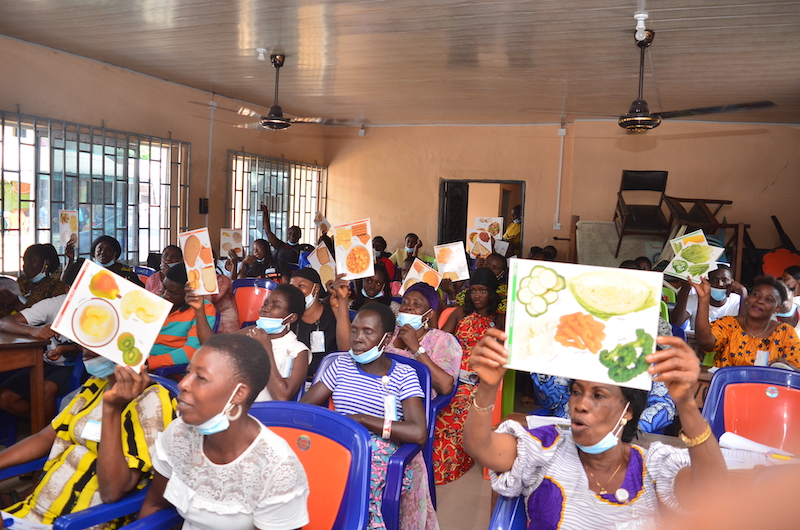
Watch the event recording: bit.ly/3yMJc7z
The Feed the Future Innovation Lab for Fish and Aquaculture Africa Magazine (AAM) bring you a set of four exciting and informative webinars that will unpack important lessons from the Fish Innovation Lab's activities in Nigeria. Join global experts as they present and discuss key aspects related to the Nigerian Aquaculture Sector and provide an opportunity for questions and interaction.
In this second event of the series, the Nourishing Nations activity team will discuss their work with women and youth fish processors in Nigeria.
This webinar will share achievements and lessons from the Fish Innovation Lab’s Nourishing Nations activity, including 1) design and implementation of the first training of women and youth fish processors in Delta State, Nigeria, which aimed to educate participants about food safety and the benefits of fish for human nutrition; and 2) traditional fish processing methods and advocacy for improvement.
AGENDA
Opening remarks: Etienne Hinrichsen, Aquaculture Africa Magazine
Introduction to the Fish Innovation Lab: Mark Lawrence, Fish Innovation Lab
An Introduction to the Nourishing Nations Project in Delta State, Nigeria: Henrietta Ene-Obong, University of Calabar, Nigeria
Designing and Implementing Nutrition and Food Safety Training of Fish Processors in Nigeria: Terezie Tolar-Peterson, Mississippi State University, USA
Improving Fish Processing in Delta State: Strategies, Challenges and Lessons Learned: Joseph Nkem Nuntah, University of Benin, Nigeria
SPEAKER BIOS
Mark Lawrence serves as the director of the Fish Innovation Lab. He provides leadership and direction for its programs, coordinates its activities, and serves as the primary liaison with USAID. He also serves as director of the Mississippi State University Global Center for Aquatic Food Security. Before serving in this role, Lawrence served as the associate dean for research and graduate studies at the MSU College of Veterinary Medicine. He was also a professor of aquatic animal health and has been a tenure-track faculty member at the college since 1998. Lawrence earned his DVM from Texas A&M University and completed a PhD in aquatic animal health at Louisiana State University.
Henrietta Ene-Obong is a professor of human nutrition and head of the Department of Human Nutrition and Dietetics, Faculty of Basic Medical Sciences at the University of Calabar. She is a fellow of the Nutrition Society of Nigeria and a fellow of the Nigerian Academy of Science. She is the current coordinator of the African Network of Food Data Systems (AFROFOODS), which is the Regional Data Centre of FAO/International Network of Food Data Systems (INFOODS), and a one-time editor-in-chief of the Nigerian Journal of Nutritional Sciences. Currently, she is a member of the Technical Advisory Group of the Tertiary Education Trust Fund on Book Development Programme in Nigeria. She is also serving as a member of the Technical Advisory Committee and co-principal investigator for the ongoing National Food Consumption and Micronutrient Survey. Her research interest is in the areas of food consumption, composition, and dietary assessment as well as traditional/indigenous people’s food systems. She has published extensively in reputable journals and has over 100 research publications to her credit.
Terezie Tolar-Peterson (Mosby) is a specialist in human nutrition with national and international experience, director of Dietetic Internship and associate professor of nutrition at the Department of Food Science, Nutrition, and Health Promotion at Mississippi State University. Her research interest is in the areas of global nutrition and food security. She is currently serving as co-PI on the USAID grant for Nourishing Nations in Nigeria, and as a co-PI on a USDA/USAID project on Complexity-Aware Research and Learning of the McGovern Dole School Meals Program in Africa. Tolar-Peterson is a fellow of the Academy of Nutrition and Dietetics.
Joseph Nkem Nuntah (PhD) is a lecturer in the Department of Aquaculture and Fisheries Management, University of Benin, Benin city, Nigeria, and project coordinator for the Feed the Future Innovation Lab for Fish Nourishing Nations research activity. His research focus is in the areas of fisheries post–harvest, fish value addition, and fish food safety.
This is the second in a four-part webinar series sharing findings and lessons from Fish Innovation Lab activities in Nigeria. Click here for more details on the full series of events.
